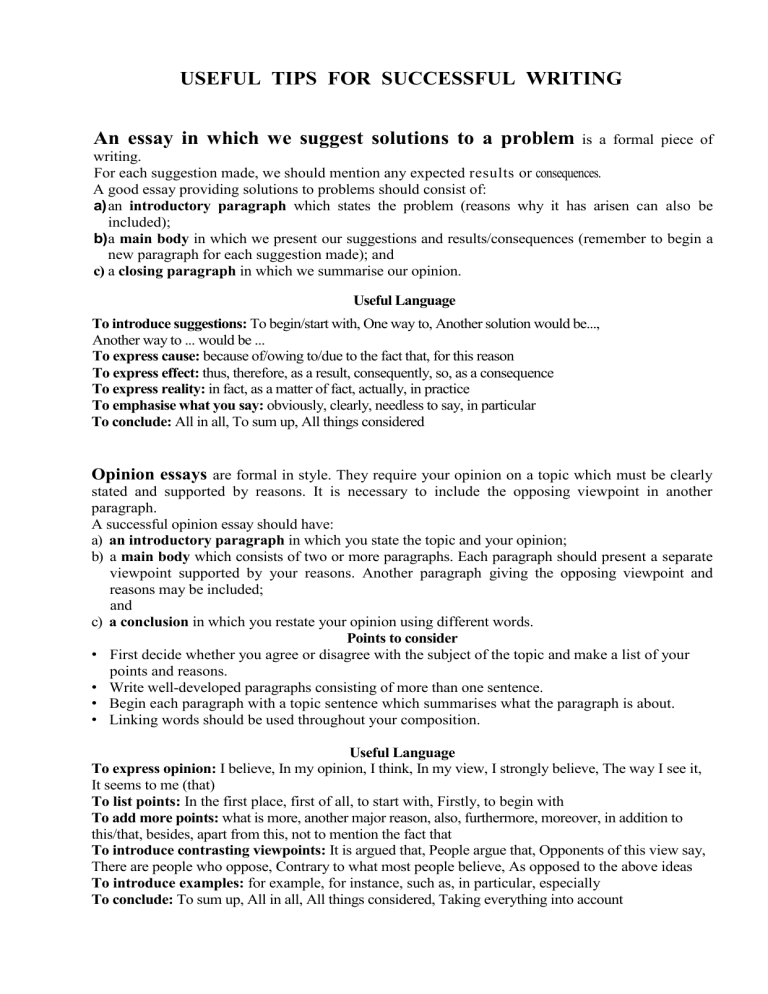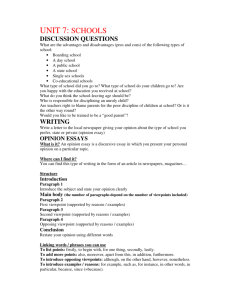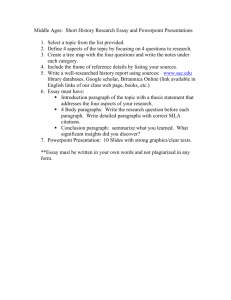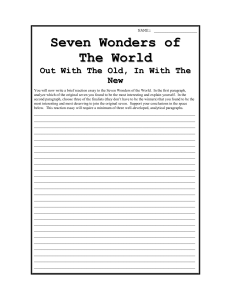
USEFUL TIPS FOR SUCCESSFUL WRITING
An essay in which we suggest solutions to a problem
is a formal piece of
writing.
For each suggestion made, we should mention any expected results or consequences.
A good essay providing solutions to problems should consist of:
a) an introductory paragraph which states the problem (reasons why it has arisen can also be
included);
b)a main body in which we present our suggestions and results/consequences (remember to begin a
new paragraph for each suggestion made); and
c) a closing paragraph in which we summarise our opinion.
Useful Language
To introduce suggestions: To begin/start with, One way to, Another solution would be...,
Another way to ... would be ...
To express cause: because of/owing to/due to the fact that, for this reason
To express effect: thus, therefore, as a result, consequently, so, as a consequence
To express reality: in fact, as a matter of fact, actually, in practice
To emphasise what you say: obviously, clearly, needless to say, in particular
To conclude: All in all, To sum up, All things considered
Opinion essays are formal in style. They require your opinion on a topic which must be clearly
stated and supported by reasons. It is necessary to include the opposing viewpoint in another
paragraph.
A successful opinion essay should have:
a) an introductory paragraph in which you state the topic and your opinion;
b) a main body which consists of two or more paragraphs. Each paragraph should present a separate
viewpoint supported by your reasons. Another paragraph giving the opposing viewpoint and
reasons may be included;
and
c) a conclusion in which you restate your opinion using different words.
Points to consider
• First decide whether you agree or disagree with the subject of the topic and make a list of your
points and reasons.
• Write well-developed paragraphs consisting of more than one sentence.
• Begin each paragraph with a topic sentence which summarises what the paragraph is about.
• Linking words should be used throughout your composition.
Useful Language
To express opinion: I believe, In my opinion, I think, In my view, I strongly believe, The way I see it,
It seems to me (that)
To list points: In the first place, first of all, to start with, Firstly, to begin with
To add more points: what is more, another major reason, also, furthermore, moreover, in addition to
this/that, besides, apart from this, not to mention the fact that
To introduce contrasting viewpoints: It is argued that, People argue that, Opponents of this view say,
There are people who oppose, Contrary to what most people believe, As opposed to the above ideas
To introduce examples: for example, for instance, such as, in particular, especially
To conclude: To sum up, All in all, All things considered, Taking everything into account
Sample Opinion Essay
Package holidays: Good or Bad?
Package holidays have several advantages. То start with, package holidays are cheaper than
travelling on your own, as the price includes the air fare and hotel accommodation. Furthermore, the
brochures from which most people select a package holiday usually give you a good idea of what the
resort offers, therefore reducing the chances of disappointment.
However, there are disadvantages to going on a package holiday. In the first place, as package
holidays are less expensive, the hotel is unlikely to be top-class. Another negative aspect is that as you
have paid for your accommodation in advance, you often feel obliged to stay in that place rather than
move around and explore. Also package holiday destinations are usually popular tourist resorts, thus
there is little opportunity to experience the true culture of the country you are visiting.
Last but not least, when visiting a new place it is often much easier to have all the details arranged
in advance as it can be rather confusing to plan everything by yourself.
Discursive essays are formal in style. In this type of essay, the writer focuses on various
aspects of the topic in turn. Some possible aspects to be considered are set out in the "discussion
clock" on this page (moral, political, social, etc.). Each viewpoint is supported by examples.
Opposing viewpoints should be mentioned as well. These essays do not aim to persuade the reader
that the writer's opinion is the only valid one, but to make him/her consider a current issue from
various angles, allowing him/her to form his/her own opinion or expand on the viewpoints already
mentioned. A good discursive essay should consist of:
a) an introduction in which you state the topic, explaining the current or past situation;
b) a main body consisting of two or more paragraphs, in each of which a viewpoint is discussed
along with the opposing viewpoint; and
c) a conclusion in which you summarise the topic by making a general comment about it. Your
opinion can also be included.
Points to consider
• When considering a topic, bear in mind the "discussion clock". This will help you decide on what
viewpoints to mention in the essay. Each topic can be seen from various viewpoints.
• Before writing your discursive essay, decide on the viewpoints you will mention. Keep in mind that
you cannot approach a topic through all the aspects presented in the discussion clock. The various
aspects illustrated are there to help you plan your essay.
• Remember that for each viewpoint you have thought of, there is an opposing argument. Think of
the opposing arguments while planning your essay.
• Join the opposing viewpoints with appropriate linking words such as however, on the other hand,
on the contrary, and contrary to.
• Avoid using simplistic words. Instead, use more sophisticated vocabulary.
Useful Language for Discursive Essays
To bring up other points or aspects: as far as, regarding, as for, with regard to
To make contrasting points: yet, however, nevertheless, although, in spite of, despite, while,
on the other hand, it is argued that, opponents of this view say, there are people who oppose, contrary
to what people believe
To conclude: all in all, to sum up, in my opinion, in my view, to my mind
To express reality: in fact, as a matter of fact, in practice, the fact is
One type of argumentative essay is that which gives advantages and disadvantages (For
and Against), it is a formal piece of writing in which a topic is considered from opposing points of
view. A good essay of this type should consist of:
a) an introductory paragraph in which you state the topic. This means that you talk generally about
the topic without giving your opinion;
b) a main body in which the points for and the points against, along with your justification, appear
in two separate paragraphs; and
c) a closing paragraph in which you give either your opinion or a balanced consideration of the
topic.
Note: In this type of essay writing, you must not include opinion words (I believe, I think, etc.) in the
introduction or the main body. Opinion words can only be used in the final paragraph, where you
may state your opinion on the topic.
Points to consider
• Make a list of the points for and against a topic before you start writing.
• Write well-developed paragraphs in which the points you present are supported with justification,
(i.e. reasons or examples). Make sure each paragraph has more than one sentence, e.g. One advantage
of using a word processor is that it saves time. It is much quicker to make corrections on one than it is to
do them by hand.
• Do not use informal style (e.g. short forms, colloquial language, etc.) or strong language {e.g. I
firmly believe, etc.)
• Try to include a quotation relevant to the topic you are writing about. For example, if you are
writing an essay on space exploration, a quotation you may include is: "One small step for a man,
one giant leap for mankind." (Neil Armstrong)
• Begin each paragraph with a topic sentence which summarises what the paragraph is about.
A review is a short description of a film, play, book, etc. It is either formal or informal in style,
depending on the readers it is addressed to. Present tenses are normally used in a review. A good
review should consist of:
a) an introduction in which you give all the background information of the story (setting, type,
characters, etc);
b) a main body consisting of two paragraphs in which all the main points of the plot are presented
in time sequence as well as comments on acting, plot, character development, directing, etc.;
c) a conclusion in which the writer recommends or does not recommend the
film/book/performance etc, giving reasons.
Useful Language for Reviews
Background: This well-written/informative/fascinating book ..., The film/story is set in...,
The film/book tells the story of..., This work is based on ..., etc.
Main points of plot: The plot focuses on ..., The story begins ..., The plot has an unexpected
twist..., The film reaches a dramatic climax ..., etc.
General comments: It is rather long/confusing/slow etc, The cast is
excellent/weak ..., The script is dull/clever..., It has a tragic/surprising end ..., etc.
Recommendations: Don't miss it, it will change the way you see ..., It is well worth seeing ...,
I wouldn't recommend it because ..., etc.
A news report
describes a particular event or topic which is of interest to the
public. It is always written in a formal impersonal style and gives accurate facts
only, not chatty descriptions. A good news report should consist of:
a) a short eye-catching headline which introduces the subject of the report;
b) an introduction which summarises the event giving information about the time, place and the
people involved;
c) a main body consisting of two or more paragraphs in which the event is developed in detail.
Information about the cause(s) and result(s) of the incident should also be included; and
d) a conclusion in which action to be taken or people's comments on the event are given.
Such pieces of writing can be found in newspapers, magazines and newsletters.
Points to consider
• Give all necessary information accurately and in detail.
• Do not write about your feelings or your point of view concerning the incidents.
• Use passive voice and direct/reported speech to include people's comments and make the news
report more interesting.
Articles are written to give information (e.g. news reports) or express opinions (e.g. argumentative
articles). They can be either formal or informal depending on the audience they are addressed to and the
topic they deal with. A good article consists of:
a) an eye-catching headline which suggests the topic of the article that follows;
b) an interesting introduction;
c) a main body consisting of two or more paragraphs in which the topic is presented in detail;
and
d) a conclusion which gives an appropriate ending to the article.
Such pieces of writing can be found in newspapers, magazines or newsletters.
Points to consider
- Decide on the style of the article before you start writing.
- Always think of a short, clear, appropriate headline which attracts the reader's interest.
- Each paragraph should deal with one aspect of the topic. You can use linking ideas or time expressions
to join your ideas or introduce paragraphs.
- Avoid using simplistic adjectives (good, nice, bad, etc). Always try to use more sophisticated vocabulary
instead, (splendid, gorgeous, awful, etc)
- Address the reader in the second person (you) if the topic of the article and the style you have adopted
permits this.
- Descriptive, narrative and argumentative techniques can be applied when writing articles.





